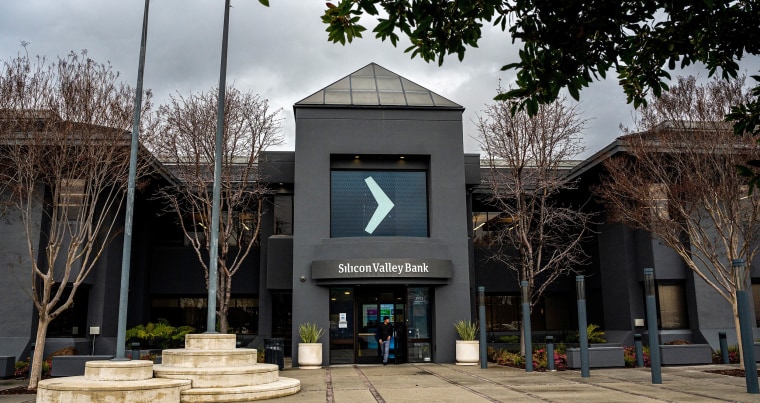Silicon Valley Bank, one of the tech sector’s favorite lenders, is shutting down.
The California Department of Financial Protection and Innovation said Friday that it was taking over and closing the distressed bank to protect deposits, naming the Federal Deposit Insurance Corporation as its receiver. The FDIC has formed a separate entity where all insured SVB deposits will be available by Monday morning.
The closure marks the biggest bank failure since the 2008 financial crisis and the second-largest in U.S. history after Washington Mutual collapsed during that industry-wide meltdown, according to FDIC data.
As of the end of December, the Santa Clara, California-based bank — the 16th largest bank in the country — had $209 billion in assets with more than $175 billion in deposits. As with other FDIC-member banks, SVB deposits are insured up to $250,000 per depositor.
But the FDIC has yet to determine how many of those deposits exceed that insurance limit, and the agency said it would be “working over the weekend” to pin that down.
Uninsured depositors, for their part, will receive an advance dividend as well as “a receivership certificate for the remaining amount of their uninsured funds. As the FDIC sells the assets of Silicon Valley Bank, future dividend payments may be made to uninsured depositors,” the agency said.
Silicon Valley Bank referred requests for comments Friday to the FDIC’s takeover notice.

The shutdown came after a tumultuous morning for SVB, during which trading of its shares was halted after they fell by double-digits before markets opened. That downslide came on the heels of a more than 60% decline Thursday.
Worries over a run at SVB led Wall Street investors to dump other bank stocks as well. Shares of some prominent West Coast lenders took sharp nosedives Friday, including First Republic Bank, PacWest Bancorp and Western Alliance Bancorporation.
The bank even called the New York Police Department on Friday morning as customers began lining up outside its Park Avenue offices to get their money, but officers who arrived on the scene left after determining “there was nothing criminal” happening, an NYPD spokesperson said.
In view of the tumult, Treasury Secretary Janet Yellen told House lawmakers Friday morning, “There are recent developments that concern a few banks that I’m monitoring very carefully, and when banks experience financial loss it is and should be a matter of concern.”
First Republic submitted a filing to the Securities and Exchange Commission Friday morning that “reiterates [its] continued safety and stability and strong capital and liquidity positions.”
Jitters around the bank followed the news this week that Silvergate, a much smaller bank largely focused on the cryptocurrency industry, announced plans to shut down. For SVB, the drama started earlier this week when it disclosed that it sold about $21 billion of securities and proposed to offer over $1 billion in shares, all to fundraise for “general corporate purposes.”
That move raised eyebrows among investors who pondered why SVB would need to raise so much money abruptly. It also sparked concerns among depositors, many of whom suddenly wondered whether their money was safe and began pulling funds out.
On Thursday, The Information reported that Silicon Valley Bank CEO Greg Becker was asking venture capital clients to “stay calm” as some tech founders began clarifying whether their companies had money at there.
Silicon Valley Bank is known for helping to finance an explosion of West Coast companies in the tech sector — an industry that has recently been walloped by high interest rates and an economic slowdown. Many of SVB’s depositors are tech startups and venture capital funds, and it doesn’t rely on mom-and-pop savings accounts like banks familiar to the average U.S. household.
SVB’s tech-focused strategy has helped it ride the industry’s massive growth leading up to and through the pandemic. But overzealous hiring during the public health crisis has more recently led the tech sector to institute sweeping layoffs, as the Federal Reserve sharply increased borrowing costs to cool inflation and has raised expectations of an economic slowdown.
“The issue here is what is the domino effect of problems outside the banking industry on the banks themselves?” Mike Mayo, a bank analyst at Wells Fargo Securities said earlier Friday, before regulators announced SVB's closure. “Banks are still the heart of the economy, and if there’s issues, then banks are going to feel it.”
Mayo cautioned that the banking system overall has more robust guardrails now than it did 15 years ago, due to policies put in place after the last financial crisis such as regulations imposing stronger capital and liquidity requirements. As one of the country’s top 20 banks by total assets, SVB is subject to stricter regulations than many other lenders.

